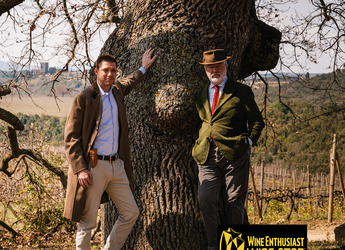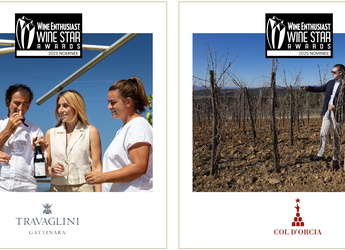
Gracias a Dios Divinely Handmade Mezcal & Gin

Follow the blindfolded angel …
After running a “speakeasy” mezcal bar in Querétaro, Mexico, for several years, longtime friends and mezcal buffs Pablo López, Enrique Jiménez, and Xaime Niembro decided to strike out with their own version of Mexico’s famed agave spirit. After all, they had the passion, they had the market knowledge. They just needed the right mezcalero who knew the art of the craft.
It took two years of searching across all of Mexico’s mezcal-producing regions before they found what (and who) they were looking for. It was the best mezcal they’d ever tasted, and it was made by fourth-generation maestro mezcalero Oscar Hernández in the nearby Oaxacan pueblo of Santiago Matatlán. Wowed by the outstanding quality — a family recipe handed down by Oscar’s great-grandfathers — and impressed by Oscar’s meticulous attention to detail, the trio quickly became a quartet with a divine mission: craft the best artisanal mezcal possible. They baptized the new venture Gracias a Dios (“Thank God”), a familiar phrase from their childhoods that radiates positivity. The mustachioed cherub became their mascot and, like one playing piñata, he dons a blindfold to symbolize the hopeful chances everyone takes in life.
From passion project to full-grown operation, Gracias a Dios uses ancestral techniques to make a wide variety of agave-based spirits, including specially flavored expressions, gins, pechugas, and limited-edition wild agave releases. In fact, one of GAD’s core devotions is protecting the wild agave and ensuring its future by carefully sowing new seeds every year.
Along with their intense focus on quality and sustainability, the GAD founders are deeply committed to their community. Their thoughtful, practical approach in the agave fields and their devotion to strengthening the local economy through job opportunities, fair wages, and excellent working conditions embody the essence of Mexico’s vibrant, family-centric culture, where everyone plays an important part.
Gracias a Dios Highlights
Gracias a Dios’ ancestral production process is incredibly labor intensive and everything is done by hand — from harvesting, roasting, crushing, fermenting, and distilling the piñas to hand bottling and labeling. The payoff is a spirit of remarkable quality.
Respecting the history and tradition of four generations, GAD proudly brings Mexico’s dynamic, joyful culture to American mezcal fans.
GAD values its people and the environment, employing eco-friendly practices that include water conservation, solar energy, and recyclable materials, along with proudly offering their local employees fair wages and on-site housing for those in need.

-
Founded
2012 -
Location
Oaxaca, Mexico -
Follow On
-
SUSTAINABILITY
Thank GAD for Oaxaca
¡La pura gozadera! It’s a phrase that, literally translated, means “pure enjoyment.” But it is also a manifesto at Gracias a Dios — a rallying cry to “always enjoy!” A statement that represents their local way of life, especially in Oaxaca, where mezcal is central to the culture.
In keeping with that Oaxacan spirit, GAD’s mission is to inspire happiness in anyone who sips their spirits. “We drink to enjoy, to relax, and to share with the people we love,” says Xaime. “We want people to enjoy every sip, and while doing it, know that they are actually helping the person who planted that maguey, the community who produces it, and the people who bottle it.”

Protecting the Future of Artisanal Mezcal & Agave Spirits
Sustainability is woven tightly into the fabric of the Gracias a Dios family and touches every part of their operation. Applying the ancestral milpa system, they eschew monoculture and plant native vegetable crops between the rows of agave plants. Each vegetable gives something back to the soil — for instance, roots from bean plants provide highly beneficial nitrogen. Every year, they let 20% of the agaves escape harvest and go to flower, so they can collect the seeds and replant. They also grow oak and mesquite trees to fuel their roasting pits. For every single tree harvested, they plant five more.
Water is a vital resource and more than half of what the GAD team use in the production process is harvested rainwater. Their palenque is totally solar powered and they also recycle everything they can — including the discarded remnants of the fermented agave, which they use to make the adobe bricks comprising their property buildings. Packaging is also mindfully done; not only are the bottles beautifully embossed, but all of them are made from 100% recycled glass.

The Art & Craft of Fine Mezcal from Mexico
Once the agave piñas are harvested, they’re split open and roasted in hand-dug, cone-shaped pit ovens using oak and mesquite grown on the property as the fuel. After about four days, the roasted piñas are cooled and ready to be ground. At Gracias a Dios’ palenque, they use a horse to pull an enormous stone wheel called a tahona — which Oscar insists is the best way to break down the fibers and extract all the flavor compounds from the cooked agave.
Once crushed, the fibers go into pine tubs and undergo a wild yeast fermentation. The must sits for a couple of days, depending on the weather, before they add water. The mash is stirred by hand to encourage the fermenting juice to rise to the top. Once ready, the precious liquid is double distilled (triple, if they’re making gin) in copper alembic stills. The bottling process is done mainly by hand and the labels are carefully affixed by a local women’s co-op.

Keeping Artisanal Mezcal in the Family
“Mezcal has been running through my veins since I was born.”
Born and raised in the small town of Santiago Matatlán (nicknamed the World Capital of Mezcal), fourth-generation Oscar Hernández began working in his parent’s small mezcal palenque at a young age. While the recipe was passed down from his great-grandfathers to his father, it was his mother María who taught him the painstaking, traditional way of making mezcal when he was just 14 years old. Since then, he’s devoted his life to the sowing and growing of maguey and crafting his family’s mezcal. Oscar’s nephew, Milo Jimenez, is now the fifth generation to learn the ropes and has been assisting Oscar in the Gracias a Dios palenque since he was 16.









